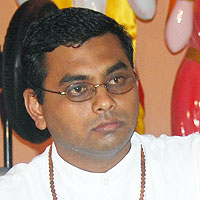 “No religion, perhaps, lays as much emphasis on environmental ethics as does Hinduism. It believes in ecological responsibility and says like Native Americans that the Earth is our Mother. It champions protection of animals, which it considers also have souls, and promotes vegetarianism. It has a strong tradition of non-violence or ahimsa. It believes that God is present in all nature, in all creatures, and in every human being regardless of their faith or lack of it.” Dr. David Frawley.
“No religion, perhaps, lays as much emphasis on environmental ethics as does Hinduism. It believes in ecological responsibility and says like Native Americans that the Earth is our Mother. It champions protection of animals, which it considers also have souls, and promotes vegetarianism. It has a strong tradition of non-violence or ahimsa. It believes that God is present in all nature, in all creatures, and in every human being regardless of their faith or lack of it.” Dr. David Frawley.
With the negative impacts of Climate Change increasing each year and being felt even by us here in Trinidad and Tobago, let’s take a minute to understand the main causes. Two (2) largest contributors are the increasing levels of greenhouse gases in the atmosphere caused by human activity – burning of hydrocarbons to provide electricity for homes, buildings, communities and cities and to power vehicles and other means of transportation all over the world, compounded by the uncontrolled deforestation of our natural forests. Trinidad and Tobago has been described by the United Nations Environment Programme’s (UNEP) Emission Country Profile Report for 2013, as a “carbon intensive economy”. T&T’s carbon dioxide per capita emissions are among the highest in the world, ranking 2nd in 2010 behind Qatar. (worldbank.org).A state of the climate report issued by NOAA Wednesday said that July 2016 was Earth’s warmest month in records dating to 1880 and this is predicted to re-occur next year.
This doesn’t reflect well on us as a people and society and with the ever increasing demand on our natural resources to provide energy, we can understand that, if we don’t become pro-active managers of our ENERGY CONSUMPTION,WASTE and WATER, we will only be adding to the doom of the future.
So what can we do as Hindus, as a community to ensure a cleaner, healthier and sustainable planet for our children, grandchildren and generations to come? Firstly we need to look at ENERGY and means of REDUCING ENERGY CONSUMPTION within our homes and where possible, in our community temples. Here are just a few tips (other than the norm) that we can adopt without needing to redesign home or building:
- Start with changing the five (5) most frequently used light fixtures with energy efficient bulbs (ENERGY STAR rating). These bulbs use 70-90% less energy than traditional incandescent bulbs and produce significantly less heat which keeps rooms a lot cooler. Battery operated, wireless, motion sensored lights are becoming increasingly popular and affordable option;
- Use ENERGY STAR appliances – especially refrigerators, freezers, televisions and AC units which require a lot of energy. This results in substantially lower electrical bills as well;
- Surround the building with more plants and shady trees – they provide clean air and cooler surroundings;
- Use window screensand awnings where possible to reduce direct light/heat into rooms;
- Install sky lights and/or sun tunnels in most frequently used rooms in your home to allow natural lighting through roof hence reducing and even eliminating the need for lights during the day – this is quite effective;
- Optimize natural ventilation – Keep one or two windows which take in air preferably from shady surrounding areas open;
- Cool smartly!
- Install solar panels – solar energy is a clean and renewable source of energy (more on this topic later).
“As we strive to become more environmentally conscious and sustainable Hindus, together let’s spread the awareness and become Pioneers for a healthier more sustainable environment, carrying on our sacred duty of preserving nature.”
New technologies are quickly emerging so do ensure you keep posted on which ones you may be able to utilize in your homes/temples. If you wish to learn more about how buildings can transform and help save the Planet, and an action plan for Trinidad and Tobago, please contact lbctrinidadandtobago@gmail.com.
Lydia Singh
SWAHA – Vice President
BSc. Eng, PMP,Living Building Ambassador(International Living Future Institute)
http://collaboratives.living-future.org/trinidad-tobago/




